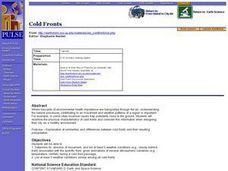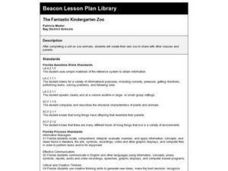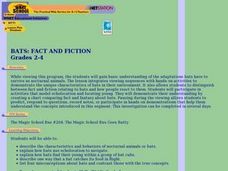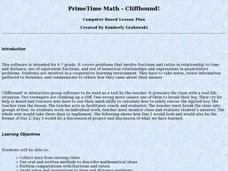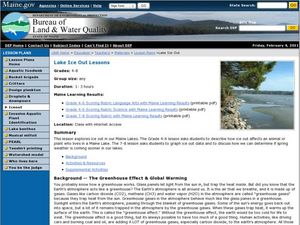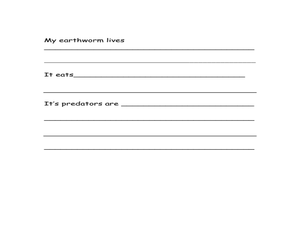Curated OER
Rain Forest Animals
Students create a book about animal species found only in the Amazon rain forest. They find one species to represent each letter of the alphabet, and write each name on a different piece of paper. They illustrate each page with an...
Curated OER
Desert Animals
First graders investigate and identify a variety of animals that live in the desert. They complete a class KWL chart, then listen to the book Way Out in the Desert. Next, 1st graders observe a presentation of live desert animals, and...
Curated OER
Cold Fronts
Students determine its' direction of movement, and list at least five weather conditions associated with the specific front, given animations of several atmospheric variables during a cold front passage. They list at least three weather...
Curated OER
Survivor
In this animal worksheet, students read a portion of a website to complete a graphic organizer explaining how 7 different animals adapt to deal with winter climate.
Curated OER
Animals: Worms
Learners research the physical characteristics of mealworms and tubefex. In this worm lesson plan, students explore worms using a microscope. Learners search their environment for worms.
Curated OER
Explorations Through Time
In this earth history learning exercise, students visit a website and complete 15 fill in the blank and 8 short answer questions based on what they read. Topics include biodiversity, animal kingdoms, evolution, fossils, and extinction.
Curated OER
Whale Adaptations
Learners explore whales and how they have adapted to survive in the ocean. In this whale adaptations instructional activity students complete several activities that allow them to investigate animal adaptations.
Curated OER
Habitats
First graders investigate animal habitats. In this habitats lesson, 1st graders visit the woods to identify examples of food, water, and shelter that animals use to survive. Students complete a worksheet.
Curated OER
The Fantastic Kindergarten Zoo
First graders create their own zoo to share with other classes and parents. Groups create displays for the animals. Have each group brainstorm how they create a display for their animal.
Curated OER
Hypothesize This!
Students role play scientists to prove a hypotheses. They determine whether or not walruses stay warmer in water or in air. Students also determine in which environment they lose more body heat.
Curated OER
Bats: Fact and Fiction
Learners describe the characteristics and behaviors of bats. After viewing a video, they explain how bats use echolocation to navigate and how they find their young within a group. They list four misconceptions about the animal and...
Curated OER
Down, Dung and Dirty
Students investigate the stages of succession in animal dung communities. They create a dung culture using fresh cow, goat or horse dung then record data on the fungal species that appear over a two week period.
Curated OER
Mini-Ecosystems
Third graders identify the living and non living things in a book read aloud and discuss the interactions represented in the book. Then, they research and include a list of food that each animal needs in an ecosystem. Finally, 3rd...
Curated OER
PrimeTime Math: Cliffbound!
Young scholars are involved in a cooperative learning environment that analyzes fractions, ratios to time and distance, equivalent fractions and numerical relationships and expressions in quantitative problems. They take notes, relate...
Curated OER
Lake Ice Out Lessons
Students explore the greenhouse effect. For this environment lesson, students describe how "ice out" affects animals and plants who live in a Maine lake. Students graph "ice out" data and make predictions about the upcoming...
Curated OER
Sea Connections: Marine Ecosystems
Students identify producers and consumers from marine ecosystems and describe the balance among them in the environments. After constructing a food chain from a marine ecosystem, they examine human activities that can upset the balance...
Curated OER
Exploring Zoo Animals
Students research topics related to zoos and zoo animals. They compare and contrast the size of animals, make a book of facts about bears, draw snakes, and write animal stories and poetry. They complete a series of writing and creative...
Curated OER
Activity: Bird Beak Buffet
Students study the functions of bird beaks. In this animal evolution lesson, students compare and contrast different types of bird beaks focusing on how the beaks are adapted to the foods the birds eat. Students record and graph their...
Curated OER
Earthworms and Making a Wormery
Students explore the environment by researching insects. In this earthworm lesson, students utilize soil and plexiglass to build a see through wormery in which students can observe the worms at work. Students identify the benefits of...
Curated OER
Fish Swimming--A Poem by Moniza Alvi
In this poetry analysis worksheet, students read the poem "Fish Swimming," and discuss the metaphors in the poem. Students complete eight activities based on the poem, including rewriting the subject of the poem and watching two...
Curated OER
How Animals Prepare for the Winter
Students study animals. In this hibernation lesson, students are read Stranger in the Woods and they discuss what various animals do in their habitat during the winter. They work as a class to create their own hibernation environment...
K12 Reader
Hide and Seek
Why do certain animals look the way they do? It could be because they have developed camouflage. Kids can read up on camouflage and mimicry and then respond to five questions related to the content of the passage.
Curated OER
Protecting Our Planet
Students examine the impact of pollution. In this pollution lesson, students watch Protecting Our Planet, then participate in a simulation of the effect of pollution on a variety of organisms.


